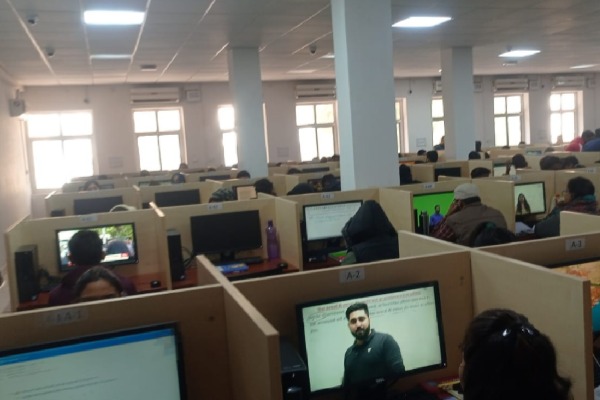
Advantages of Pursuing a Polytechnic Course Over Traditional Degrees
Today’s job market values hands-on skills, fast adaptability, and real-world knowledge. When it comes to choosing the right course after school, the debate of polytechnic vs traditional degree becomes crucial. Both have their advantages, but polytechnic education stands out for those aiming at practical skills and early career entry. More students are now rethinking their choices based on industry needs. Polytechnic courses offer focused training, shorter durations, and better job readiness.
Since 2004, Dr. M.C. Saxena Group of Colleges has been shaping future professionals with cutting-edge technical education that meets today’s industry demands.
Table of Contents
- What is a Polytechnic Course
- Polytechnic vs Traditional Degree: A Clear Comparison
- Key Benefits of Choosing a Polytechnic Course
- Debunking Myths About Polytechnic Education
- Career Opportunities After a Polytechnic Diploma
- Why Choose Polytechnic: Expert Insights
- Shape Your Future with Dr. M.C. Saxena Group of Colleges
- Frequently Asked Questions
What is a Polytechnic Course
A polytechnic course is a technical diploma program designed to provide practical knowledge in engineering, technology, or applied sciences. These programs usually last three years and are focused on building industry-ready skills.
Students can join after completing Class 10 or Class 12, depending on the course type. The training includes workshops, industrial visits, and real-world projects.
This structure helps students become job-ready soon after completion, giving them a head-start in their careers.
Polytechnic vs Traditional Degree: A Clear Comparison
The polytechnic vs traditional degree debate revolves around duration, cost, and job readiness. Here’s how they differ:
|
Feature |
Polytechnic Course |
Traditional Degree |
|
Duration |
3 Years |
3 to 4 Years |
|
Focus |
Practical Skills |
Theoretical Knowledge |
|
Entry Point |
After Class 10 or 12 |
After Class 12 |
|
Job Readiness |
High |
Moderate |
|
Tuition Fee |
Affordable |
Higher Cost |
|
Internship |
Mandatory |
Optional |
|
Early Employment |
Possible |
Delayed |
|
Flexibility for Higher Studies |
Yes |
Yes |
The above table shows how polytechnic courses are better suited for students looking for early employment with strong technical abilities.
Key Benefits of Choosing a Polytechnic Course
Understanding the benefits of polytechnic education helps students and parents make informed decisions.
1. Early Career Start
Students can begin working soon after finishing the diploma. This helps them gain experience while their peers are still studying.
2. Skill-Based Learning
The courses focus more on labs and hands-on training than classroom lectures. This approach prepares students for real work conditions.
3. Cost Effective
Polytechnic courses are more affordable. They save time and money while still providing good employment opportunities.
4. Industry Demand
Industries require skilled technicians and engineers who can start contributing immediately. Polytechnic diploma holders match this demand well.
5. Scope for Higher Education
After completing a diploma, students can also enter the second year of engineering programs, giving them flexibility for future growth.
Debunking Myths About Polytechnic Education
Before you start searching for the best polytechnic college in India, take a moment to clear the air. Let’s bust some common myths that might be holding you back from a smart career move.
Myth 1: Polytechnic Education is Less Valuable Than a University Degree
Reality Check:
- This couldn’t be further from the truth. Polytechnic education is not about being less, it’s about being different.
- While universities tend to focus more on theories and academics, polytechnic courses train you for the real world. You learn the hands-on skills employers actually want. That means you’re often ready to jump into the job market even before your university peers have finished their degrees.
Myth 2: Polytechnic Graduates Have Fewer Career Choices
Reality Check:
- Think again. Polytechnic diploma holders are in demand across many industries.
- From engineering and IT to healthcare and hospitality, polytechnic graduates land solid roles thanks to their technical expertise. Many even go on to pursue higher studies, like B.Tech through lateral entry. So the doors to career growth and education stay completely open.
Myth 3: Only Less Academic Students Choose Polytechnic
Reality Check:
- This is one of the oldest and most misleading myths. Polytechnic courses are built for students who prefer practical learning and skill based development, not just textbooks and lectures.
- Plenty of high-performing students choose this route because it suits their learning style better. Polytechnic institutions offer an inclusive environment that supports all kinds of learners.
Myth 4: Polytechnic Graduates Don’t Earn Well
Reality Check:
- Your paycheck doesn’t depend on your degree alone, it depends on your skills, industry, and experience.
- Polytechnic graduates often secure high-paying roles in sectors that need technical talent fast. Plus, with many companies shifting to skills-first hiring, those with real-world abilities often earn just as much or more than traditional graduates.
Career Opportunities After a Polytechnic Diploma
A polytechnic diploma opens the door to multiple career options. Here are the most common jobs:
- Junior Engineer in Public or Private Sector
- Technician in Manufacturing or IT Companies
- Assistant Design Engineer
- Quality Control Officer
- Maintenance Engineer
- Government Sector Jobs through SSC JE and other exams
With experience, many diploma holders also become entrepreneurs or pursue higher education for growth.
The polytechnic vs engineering degree choice also comes into play here. Polytechnic provides faster job access, while engineering requires more time and investment.
Why Choose Polytechnic: Expert Insights
Understanding why choose polytechnic over a traditional degree can help parents and students plan better.
- Polytechnic courses are ideal for students interested in immediate jobs with strong practical skills.
- Many industries, including telecom, IT, electronics, and construction, prefer diploma holders for technical roles.
- Career advancement is possible through part-time studies, online degrees, or lateral entry into engineering programs.
- The demand for diploma holders is likely to rise as industries shift towards automation and technology.
The polytechnic diploma advantages include early income, low investment, skill mastery, and higher adaptability to job changes.
Shape Your Future with Dr. M.C. Saxena Group of Colleges
If you are passionate about building a strong, skill-driven career, the right foundation matters. Polytechnic courses can give you that start.
Our colleges have been committed since 2004 to providing industry-focused education in engineering, pharmacy, management, and more.
Make your first step count with a polytechnic course at Dr. M.C. Saxena Group of Colleges and prepare yourself for a brighter, career-driven future.
- Email: atmcscet@rediffmail.com
- Call: +91 9936052233
Frequently Asked Questions
Q1. Can I pursue higher education after completing a polytechnic course?
A. Yes, after completing a polytechnic diploma, you can enrol directly into the second year of a B.Tech or BE program through lateral entry.
Q2. Is a polytechnic diploma recognised for government jobs?
A. Yes, many government organisations conduct recruitment exams specifically for diploma holders, such as SSC JE, DRDO, and PSU technician posts.
Q3. Which stream is best for a polytechnic course?
A. Streams like Mechanical, Electrical, Civil, Computer Science, and Electronics are highly preferred due to strong industry demand and job availability.
Q4. How is a polytechnic course different from an engineering degree?
A. A polytechnic course is shorter, more practical, and focuses on technical skills. An engineering degree is more theory-oriented and requires more time to complete





































































